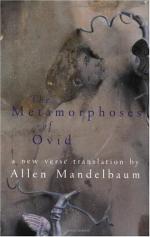|
This section contains 5,045 words (approx. 17 pages at 300 words per page) |

|
SOURCE: Ginsberg, Warren. “Ovid's Metamorphoses and the Politics of Interpretation.” The Classical Journal 84, no. 3 (April 1998): 222-31.
In the following essay, Ginsberg argues that the metaphors Ovid uses in the Metamorphoses create ambiguities, allowing for flexible and even contradictory interpretations of the poem.
Ovid's lack of high seriousness has always more successfully interpreted his readers than they have it. In the Middle Ages, for instance, commentators kindly furnished Ovid a moral dignity I am sure would have delighted him. As a repository of natural science, the Metamorphoses always commanded respect.1 But Ovid's singular virtue during this time was seen as ethical, since readers whose temperament had been conditioned by allegory could avoid surface unseemliness by discovering a decorous example beneath.2 An ever-present tension, however, subtended all such moralizations, for the age that Ovid so entranced also harkened with alarm to Paul, who foretold a time when itching ears (prurientes...
|
This section contains 5,045 words (approx. 17 pages at 300 words per page) |

|


